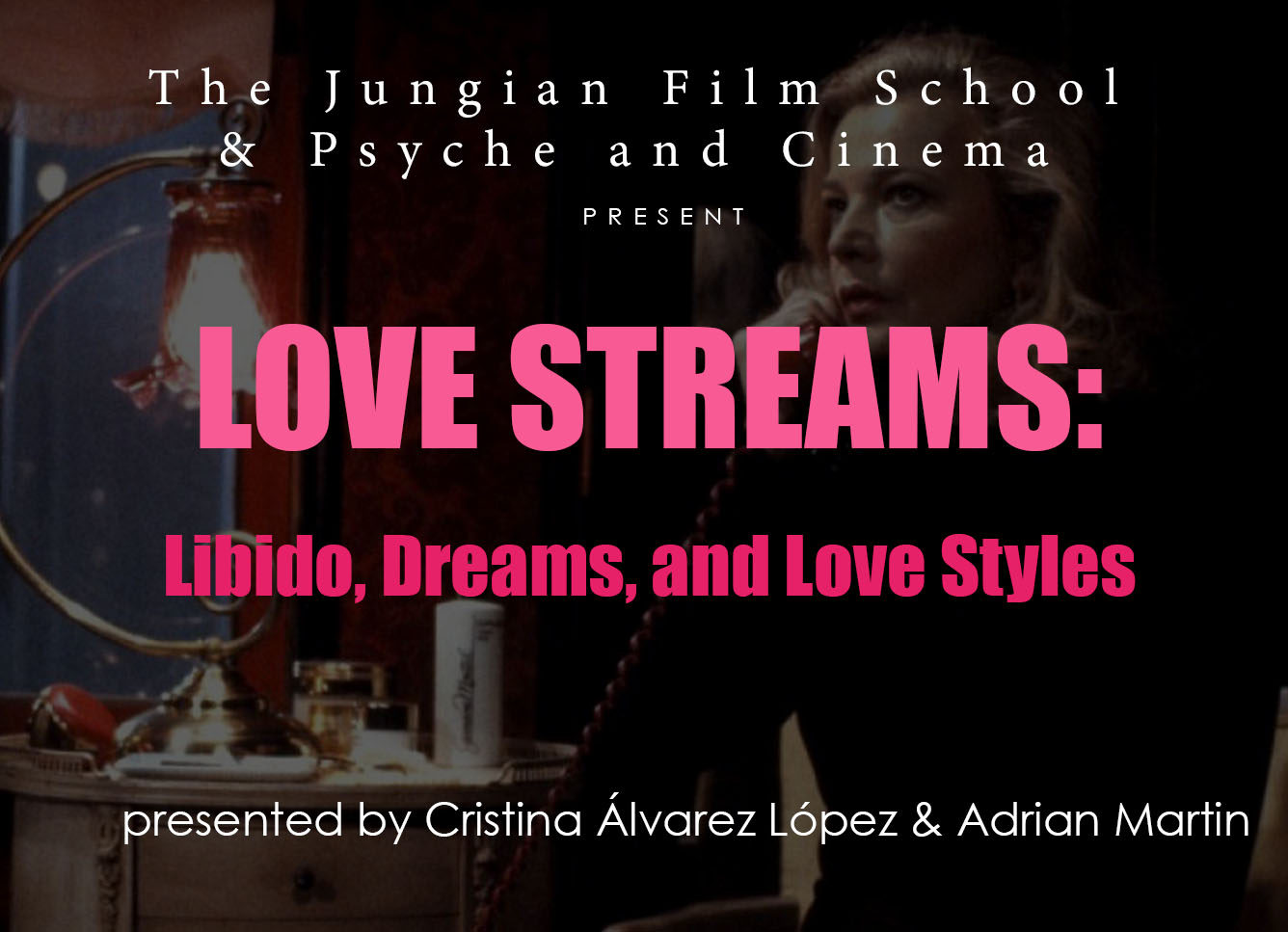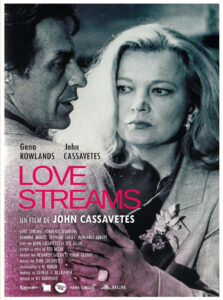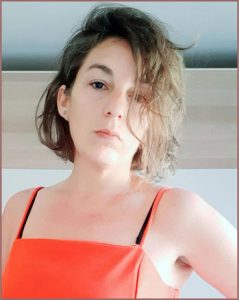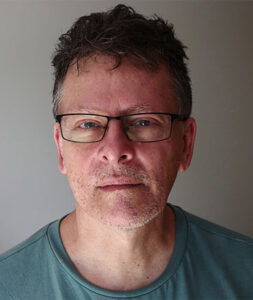

“Life is a series of suicides, divorces, promises broken, children smashed, whatever”. – Love Streams
 Love Streams (1984) is effectively the final work of director-writer-actor John Cassavetes over which he had total creative control. Based on a semi-autobiographical play by Canadian writer Ted Allan (Lies My Father Told Me, 1975), Cassavetes adapted it to conform to his own ‘extended family’ circle: he and his wife, the great Gena Rowlands, take the lead roles of brother and sister, and it was mostly shot inside their own home, with their usual crew of relatives and friends. Cassavetes stated succinctly at the outset that Love Streams is about “the problem of love, and where to put it”. It traces two very different styles of loving, alternating in its first hour between the decadent, dissolute night-world of divorcée Robert (Cassavetes), and the overflowing, sacrificial, family-centred acts of soon-to-be-divorced Sarah (Rowlands). Yet both of these people are wounded, dysfunctional, yearning for a wholeness that eludes them.
Love Streams (1984) is effectively the final work of director-writer-actor John Cassavetes over which he had total creative control. Based on a semi-autobiographical play by Canadian writer Ted Allan (Lies My Father Told Me, 1975), Cassavetes adapted it to conform to his own ‘extended family’ circle: he and his wife, the great Gena Rowlands, take the lead roles of brother and sister, and it was mostly shot inside their own home, with their usual crew of relatives and friends. Cassavetes stated succinctly at the outset that Love Streams is about “the problem of love, and where to put it”. It traces two very different styles of loving, alternating in its first hour between the decadent, dissolute night-world of divorcée Robert (Cassavetes), and the overflowing, sacrificial, family-centred acts of soon-to-be-divorced Sarah (Rowlands). Yet both of these people are wounded, dysfunctional, yearning for a wholeness that eludes them.
To fully explore the consequences of the time Sarah and Robert eventually spend together, Cassavetes spontaneously threw out the script well into the production, and began to invent remarkable scenes, including two extraordinary dream sequences. In fact, as Cassavetes confided to journalist Michael Ventura (co-author with James Hillman of We’ve Had a Hundred Years of Psychotherapy – and The World’s Getting Worse, 1992), “the [entire] film is a dream”.
“Life is a series of suicides, divorces, promises broken, children smashed, whatever”. – Love Streams

Love Streams (1984) is effectively the final work of director-writer-actor John Cassavetes over which he had total creative control. Based on a semi-autobiographical play by Canadian writer Ted Allan (Lies My Father Told Me, 1975), Cassavetes adapted it to conform to his own ‘extended family’ circle: he and his wife, the great Gena Rowlands, take the lead roles of brother and sister, and it was mostly shot inside their own home, with their usual crew of relatives and friends. Cassavetes stated succinctly at the outset that Love Streams is about “the problem of love, and where to put it”. It traces two very different styles of loving, alternating in its first hour between the decadent, dissolute night-world of divorcée Robert (Cassavetes), and the overflowing, sacrificial, family-centred acts of soon-to-be-divorced Sarah (Rowlands). Yet both of these people are wounded, dysfunctional, yearning for a wholeness that eludes them.
To fully explore the consequences of the time Sarah and Robert eventually spend together, Cassavetes spontaneously threw out the script well into the production, and began to invent remarkable scenes, including two extraordinary dream sequences. In fact, as Cassavetes confided to journalist Michael Ventura (co-author with James Hillman of We’ve Had a Hundred Years of Psychotherapy – and The World’s Getting Worse, 1992), “the [entire] film is a dream”.
In these sessions, we offer an account of the unique, revolutionary cinematic approach of Cassavetes to filmmaking. We draw upon Jungian ideas about the libido and the process of individuation in order to investigate the role of dreams, fantasies, animals—as well as the archetypal foundation and the psychological significance of different ways of loving.
In these sessions, we offer an account of the unique, revolutionary cinematic approach of Cassavetes to filmmaking. We draw upon Jungian ideas about the libido and the process of individuation in order to investigate the role of dreams, fantasies, animals—as well as the archetypal foundation and the psychological significance of different ways of loving.
Webinar 1
Webinar 2

Cristina Álvarez López is a film critic, writer, filmmaker, occasional teacher, and general practitioner of image sorcery. During childhood, she became fascinated by the power of words and images; most of her adult life has been spent pursuing different ways of approaching and combining them. She started to write professionally about film in 2009. She has contributed chapters to a dozen books, her texts and audiovisual essays have regularly appeared in print and online magazines, and she has lectured at different schools and universities.
In 2017, she encountered the writings of C. J. Jung for the first time, while collecting stones at the beach. Since then, she has been steadily reading, wrestling with and incorporating Jungian and post-Jungian psychology to her work and life (with special interest in tracking and elucidating the meaning and value of crisis, depression and “the dark night of the soul”).
In 2020, she began making little films and experimenting with different kinds of image-work. Over the last years, she’s cried a lot—but (amazingly enough) she has also started remembering her dreams. Recently, in collaboration with Adrian Martin, she’s been making a series of multimedia lectures on film and compiling a selection of their audiovisual essays. In 2022 she decided to concentrate her efforts on pursuing her creativity independently, at her blog Laugh Motel.

Cristina Álvarez López is a film critic, writer, filmmaker, occasional teacher, and general practitioner of image sorcery. During childhood, she became fascinated by the power of words and images; most of her adult life has been spent pursuing different ways of approaching and combining them. She started to write professionally about film in 2009. She has contributed chapters to a dozen books, her texts and audiovisual essays have regularly appeared in print and online magazines, and she has lectured at different schools and universities.
In 2017, she encountered the writings of C. J. Jung for the first time, while collecting stones at the beach. Since then, she has been steadily reading, wrestling with and incorporating Jungian and post-Jungian psychology to her work and life (with special interest in tracking and elucidating the meaning and value of crisis, depression and “the dark night of the soul”).
In 2020, she began making little films and experimenting with different kinds of image-work. Over the last years, she’s cried a lot—but (amazingly enough) she has also started remembering her dreams. Recently, in collaboration with Adrian Martin, she’s been making a series of multimedia lectures on film and compiling a selection of their audiovisual essays. In 2022 she decided to concentrate her efforts on pursuing her creativity independently, at her blog Laugh Motel.
 Adrian Martin is a film & arts critic, writer, teacher, speaker, and maker of audiovisual essays with Cristina Álvarez López. He appears to have written every day of the past 45 years, judging from his ever-expanding website: www.filmcritic.com.au. From his 10 published books, his essay collection spanning 1982 to 2016, Mysteries of Cinema (Amsterdam University Press 2018/University of Western Australia Publishing 2020) reveals most clearly his lifelong interest in dreams, trance states, metamorphoses, and all forms of poetic expression. His most recent book, Filmmakers Thinking (EQZE, 2023), attempts to get inside the heads of filmmakers past and present.
Adrian Martin is a film & arts critic, writer, teacher, speaker, and maker of audiovisual essays with Cristina Álvarez López. He appears to have written every day of the past 45 years, judging from his ever-expanding website: www.filmcritic.com.au. From his 10 published books, his essay collection spanning 1982 to 2016, Mysteries of Cinema (Amsterdam University Press 2018/University of Western Australia Publishing 2020) reveals most clearly his lifelong interest in dreams, trance states, metamorphoses, and all forms of poetic expression. His most recent book, Filmmakers Thinking (EQZE, 2023), attempts to get inside the heads of filmmakers past and present.
I am a relative newcomer to Jungian and post-Jungian ideas, although I feel I have pursued ‘nearby’ interests and orientations all my life: in Surrealist art & thought, Pier Paolo Pasolini’s notion of a ‘cinema of poetry’, Luisa Valenzuela’s anarchic-feminist novel Deathcats, René Daumal’s speculative-spiritual fiction, and Norman O. Brown’s philosophy. I’ve spent many years studying ‘continental’ philosophy & critique (a lot of Freud & Lacan in there), but have always favoured the more playful & visionary extremes of it in Deleuze & Guattari, Michel Serres, Julia Kristeva, Pierre Klossowski, Mario Perniola, and others. More recently I’ve been drawn to the words of Irene Claremont de Castillejo, James Hillman and Marie Louise von Franz. Lyrical writing will always get me in!
Since 2012, I’ve put a lot of energy into making audiovisual essays: a different, more material and sensual way of thinking critically, alive to unconscious associations, flows and impulses. The monthly series that Cristina & I make, The Thinking Machine, is viewable at https://filmkrant.nl/tag/english/.

Adrian Martin is a film & arts critic, writer, teacher, speaker, and maker of audiovisual essays with Cristina Álvarez López. He appears to have written every day of the past 45 years, judging from his ever-expanding website: www.filmcritic.com.au. From his 10 published books, his essay collection spanning 1982 to 2016, Mysteries of Cinema (Amsterdam University Press 2018/University of Western Australia Publishing 2020) reveals most clearly his lifelong interest in dreams, trance states, metamorphoses, and all forms of poetic expression. His most recent book, Filmmakers Thinking (EQZE, 2023), attempts to get inside the heads of filmmakers past and present.
I am a relative newcomer to Jungian and post-Jungian ideas, although I feel I have pursued ‘nearby’ interests and orientations all my life: in Surrealist art & thought, Pier Paolo Pasolini’s notion of a ‘cinema of poetry’, Luisa Valenzuela’s anarchic-feminist novel Deathcats, René Daumal’s speculative-spiritual fiction, and Norman O. Brown’s philosophy. I’ve spent many years studying ‘continental’ philosophy & critique (a lot of Freud & Lacan in there), but have always favoured the more playful & visionary extremes of it in Deleuze & Guattari, Michel Serres, Julia Kristeva, Pierre Klossowski, Mario Perniola, and others. More recently I’ve been drawn to the words of Irene Claremont de Castillejo, James Hillman and Marie Louise von Franz. Lyrical writing will always get me in!
Since 2012, I’ve put a lot of energy into making audiovisual essays: a different, more material and sensual way of thinking critically, alive to unconscious associations, flows and impulses. The monthly series that Cristina & I make, The Thinking Machine, is viewable at https://filmkrant.nl/tag/english/.



